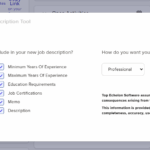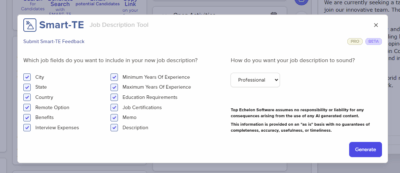We’ve discussed before in the Top Echelon Blog how recruiting is a sales profession. And since it is a sales profession, there is a lot of recruitment negotiation contained within it. A lot.
In fact, negotiation is at the heart of what professional recruiters and executive search consultants do, and they do it on a daily basis. That’s because, of course, there are people on both ends of the sale. There’s the hiring manager or hiring authority. There is the candidate. But what about the candidate’s spouse? And on the employer side, is there somebody else in the organization who has input or an opinion about the hiring process and how it should be conducted? Probably!
That’s why we’re going to rely upon the sage wisdom of recruiting and staffing industry trainer Barb Bruno of Good as Gold Training and Development to help us navigate this often tricky topic. According to Bruno, there are number times during the placement process when negotiations take place.
“You must become proficient in negotiating because you have people on both sides of your sale,” said Bruno. “Improving your ability to negotiate will have a very positive impact on your income.”
Bruno indicated that it’s imperative for a professional recruiter or search consultant to establish themselves as a negotiator very early in the process. And if you’re asking with whom you should establish yourself as a negotiator, the short answer is, “Everybody!”
“Establish yourself as a negotiator to both the client and candidate,” said Bruno. “It is very important to remember their only interest is WIIFM, or their ‘What’s In It For Me?’”
According to Bruno, your attitude is important in terms of recruitment negotiation. After all, being part of a negotiation isn’t exactly the average person’s idea of a good time, so if you’re going to get “buy in” from everybody involved, then you must take the lead and brand yourself—and the situation—in the proper way. If you don’t, then the negotiations might not go the way you want them to.
“Enthusiasm is contagious, so is uncertainty,” said Bruno. “Your attitude can make or break your ability to negotiate.”
Recruitment negotiation: 10 reasons to become better
But perhaps you’re not yet convinced. Maybe you’re satisfied with the level of recruitment negotiation that you provide to both your clients and candidates. And hey, maybe that level has served you well these many years. However, there is always room for improvement. And if there’s room for improvement, what’s the downside of striving to improve? There is no downside, that’s what!
And on top of that, Bruno has 10 reasons why search consultants should strive to become better at recruitment negotiation with candidates, clients, and everybody else who might be part of the hiring process. Those reasons are as follows:
#1—Improve profitability.
This is the bottom line, correct? Actually, it’s the very definition of the bottom line, at least from a financial standpoint. Better recruitment negotiation leads to better profits. (We could stop here, and that would be all the reason you need.)
#2—Achieve desired outcomes while fostering relationships.
The recruiting profession is all about relationships, building them and fostering them. When you’re a better negotiator, you’re better able to do both of these things.
#3—Maximize financial returns and value in negotiations.
When you are a better negotiator, you provide more value to both your clients and also to the candidate who are part of the hiring process. When you provide more value to others, it is considered an investment in the future, one that could pay significant returns.
#4—Avoid getting paid less than the value of your services.
Too often, recruiters have to fight to be seen as a valued service. By offering more value in the form of negotiation, hiring managers and clients will be less likely to balk at your fee percentages.
#5—Neutralize difficult negotiators and their tactics.
This is a good reason to continually improve your recruitment negotiation skills. That’s because there are plenty of other people in the world who are good negotiators and will “throw everything but the kitchen sink” at you.
#6—Enter into and conduct negotiations with confidence.
There is no downside to confidence, although overconfidence is another thing altogether. As Barb Bruno pointed out, uncertainty is contagious. You don’t want to allow uncertainty into the process at any point, especially if that process could end in a placement.
#7—Know when and how to walk away from a negotiation.
Not every negotiation ends in an amicable way, but every negotiation takes time, which is why it’s important to know when to “pick your battles.” If you don’t, then you might be wasting more time and making few placements.
#8—Improve relationships with clients and candidates.
Not only can you build and maintain new relationships with potential clients and candidates, but you can also improve relationships with current clients and candidates. And once again, there is no downside to having improved relationships across the board.
#9—Acquire leadership and team-building skills.
Recruitment negotiation is a skill that you can apply in a variety of settings, not just during the hiring or placement process. If you’re an agency owner or manager, you can put it to use within your organization in an effort to build camaraderie and increase production.
#10—Turn differences into assets rather than liabilities.
Everybody is different and everybody brings something different to the table, including if it’s the negotiating table. So, rather than allow these differences to derail the process, you can use your refined and improved negotiation skills to “smooth things over” and leverage everybody’s strengths instead of magnifying their differences.
Recruitment negotiation starts with YOU
According to Bruno, most studies on negotiations state that in more than 75% of all negotiations, both parties wait to see what the other party will do before they decide what to do themselves.
What that means is that a person who has any negotiation framework in mind gains an enormous advantage in the negotiation process,” she said.
This, perhaps more than anything else, is proof that search consultants should “set the tone” when it comes to recruitment negotiation. After all, if most people are waiting to see what you’re going to do, then there’s no point in sitting back to see what they are going to do. Instead, be proactive. (You can be aggressive, but don’t come off as being aggressive. Nobody likes that.)
As with anything else, you will become better at recruitment negotiation over time. And we’ve already addressed the benefits of continuous improvement in this area.
“With a framework, you will be able to set the agenda, establish the tone of the negotiation, and direct how the negotiation proceeds,” said Bruno. “The more comfortable you become at negotiating, the more successful you will become in the recruiting profession.”








